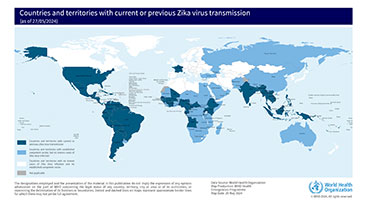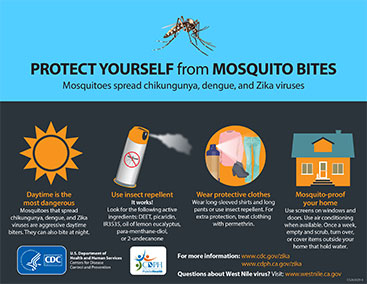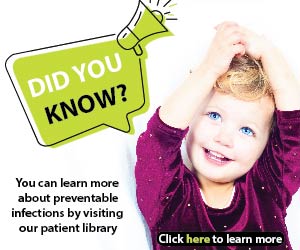Here you will find some helpful information on mosquito-borne diseases that you can use to stay protected at home and abroad.
The mosquito might not seem as big and scary as the animals shown in our infographic, but these little insects are the most dangerous animals in the world.1 That’s because mosquitoes are capable of spreading many disease-causing viruses and parasites, including yellow fever, zika, dengue fever, Chikungunya, malaria, Tularemia and more. In fact, mosquitoes are responsible for transmitting a variety of diseases to an estimated 700 million people or more annually.
The World Health Organisation estimates that 1 million people die each year due to mosquito-borne diseases.2 Malaria alone incapacitates a staggering 200 million people – of those affected, 600,000 die.2
Mosquitoes are found in abundance in tropical areas and can also survive the winter in countries with lower temperatures, such as Canada. There are over 3,000 types of mosquito and they all have the ability to transfer potentially lethal diseases. Thanks to its alarming efficiency when it comes to transmitting disease, the mosquito may be our number one health threat.
We invite you to click on the different types of mosquito-borne illnesses listed below to learn more about the disease, methods of prevention, possible treatment(s), and where in the world you could be most at risk.
Vaccine Preventable Mosquito-Borne Diseases
Mosquito-Borne Disease with Treatment
Some Mosquito-Borne Diseases Currently Without Vaccines or Treatment
Useful Tips to Stay Protected at Home and Abroad
- Make sure your vaccinations are up-to-date – where are you travelling? Find out which vaccines you might need based on your travel destination with the Public Health Agency of Canada. Once done, speak to your healthcare provider about which ones are right for you.
- Wear insect repellent – insect repellent is the best form of protection against all the mosquito-borne diseases when used as directed. Learn about personal insect repellents; how to use them safely and how to choose the right one for your needs from the government of Canada.
- Sleep under a bed net when appropriate to reduce the risk of mosquito bites - learn key points to using a bed net, preferably treated with insecticide, by the Government of Canada.
- Wear long-sleeved shirts and pants to stay covered up.
- Minimize the amount of stagnant water around your home – stagnant water is where mosquitoes breed. Places where stagnant water might accumulate include old containers, flower pots, and used tires.
- Close doors, windows, and window screens to keep mosquitoes out.
Beware of Mosquito Bites:
Featured Resources:
- Sick of Mosquitoes? Vaccines411
- Vector-Borne diseases - APHL
- 17 New viruses in mosquitoes: increased monitoring and recommended preventive measures - GDG Environment
- Scientists and students unite on the hunt for invasive mosquitoes - Government of Canada
- Genetically modified mosquitoes and malaria in Africa: top scientist shares latest advances - The Conversation
- The researcher versus the mosquitoes - Bill & Melinda Gates Foundation
- Mosquito-borne diseases - The World Mosquito Program
- Mosquito-borne diseases - World Health Organization
- ACLS guide to dengue fever: Symptoms and treatments - Pacific Medical ACLS
Tips & Tools
- Patient Information Library - Vaccines411
- Travel Resources - Vaccines411
- See what is new with vector-borne diseases in Canada - CAHSS
- 110 trillion reasons to be prepared - Valneva
- Countries and Territories at Risk for Zika - CDC
- Travel Health Notices - CDC
- Fact sheets: Zika - World Health Organization
- Protect yourself and your animals from mosquito and tick bites - Gouvernement du Quebec
- About Mosquito Bites - CDC
- 16 natural remedies for mosquito bite relief - Healthline
Infographics/Fact Snacks:
This list of resources is in no way complete, if you have a resource link which should be included on this page please contact us at ac.114seniccav@troppus.
This information should not be used as a substitute for the medical care and advice of your doctor. There may be variations in treatment that your physician may recommend based on individual facts and circumstances.
Sources
Note: the hyperlinks that direct to other sites are not continuously updated. It is possible that some links become untraceable over time. Thank you.
- https://www.gatesnotes.com/Health/Most-Lethal-Animal-Mosquito-Week
- https://www.who.int/news-room/fact-sheets/detail/vector-borne-diseases









